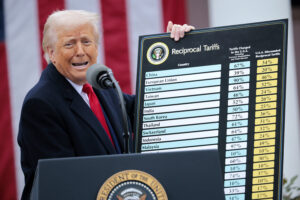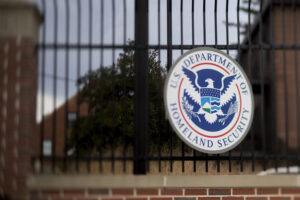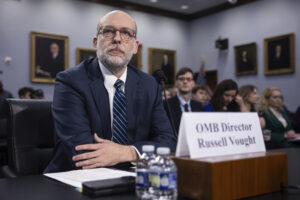The Dictatorship
Roanoke-based federal judge tosses lawsuit by Trump against Maryland federal judges, calling it ‘potentially calamitous’

BALTIMORE (AP) — A federal judge on Tuesday threw out the Trump administration’s lawsuit against Maryland’s entire federal bench in an emphatic ruling that underscored the extraordinary nature of the suit, slamming it as “potentially calamitous.”
U.S. District Judge Thomas Cullen, who was nominated by President Donald Trump, also criticized the administration’s attacks on the judiciary, highlighting in a footnote that White House officials in recent months had described judges as “rogue,” “unhinged” and “crooked,” among other epithets.
“Although some tension between the coordinate branches of government is a hallmark of our constitutional system, this concerted effort by the Executive to smear and impugn individual judges who rule against it is both unprecedented and unfortunate,” he wrote.

Attorney General Pam Bondi speaks with reporters during a briefing with President Donald Trump in the James Brady Press Briefing Room at the White House, Monday, Aug. 11, 2025, in Washington. (AP Photo/Mark Schiefelbein)
Attorney General Pam Bondi speaks with reporters during a briefing with President Donald Trump in the James Brady Press Briefing Room at the White House, Monday, Aug. 11, 2025, in Washington. (AP Photo/Mark Schiefelbein)
The Trump administration filed a notice of appeal.
At issue in the lawsuit is an order by the chief judge of the Maryland district court that stopped the immediate deportation of migrants challenging their removals. The Justice Department said the automatic pause impeded the president’s authority to enforce immigration laws, and it sought a court order blocking it.
Cullen said allowing the suit to continue “would run counter to overwhelming precedent, depart from longstanding constitutional tradition, and offend the rule of law.”
“In their wisdom, the Constitution’s framers joined three coordinate branches to establish a single sovereign,” Cullen wrote. “That structure may occasionally engender clashes between two branches and encroachment by one branch on another’s authority. But mediating those disputes must occur in a manner that respects the Judiciary’s constitutional role.”
Unfavorable rulings for Trump
The lawsuit, which the Justice Department filed in June, was a remarkable legal maneuver, ratcheting up the Trump administration’s fight with the federal judiciary. The department has grown increasingly frustrated by rulings blocking Trump’s agenda, repeatedly accusing federal judges of improperly impeding his powers.
“The Maryland court’s order upholds a direct assault on the President’s ability to enforce the immigration laws,” White House spokesperson Abigail Jackson said in a statement Tuesday. “This will not be the final say on the matter, and the Trump Administration looks forward to ultimate victory on the issue.”
Trump has railed against unfavorable judicial rulings and in one case called for the impeachment of a federal judge in Washington who ordered planeloads of deported immigrants to be turned around. In July, the Justice Department filed a misconduct complaint against that judge.
The Maryland judges, represented by prominent conservative lawyer Paul Clement, argued the administration’s lawsuit sought to limit the power of the judiciary to review certain immigration proceedings while it pursued a mass deportation agenda.
Among the judges named in the lawsuit was Paula Xinis, who found the Trump administration in March illegally deported Kilmar Abrego Garcia to El Salvador — a case that quickly became a flashpoint in Trump’s immigration crackdown.
Cullen, who was nominated to the federal bench by Trump in 2020, serves in the Western District of Virginia but was tapped to oversee the case because all 15 of Maryland’s federal judges were named as defendants along with the court clerk and the court itself, a highly unusual circumstance he noted in his ruling.
“In casting its wide net, the Executive ensnared an entire judicial body — a vital part of this coordinate branch of government — and its principal officers in novel and potentially calamitous litigation,” he wrote.
Cullen found the administration lacked the legal authority to bring the suit, but he said even if it could, the judges were immune. Instead of the “more confrontational” approach of a lawsuit, the administration should have appealed the chief judge’s order, he wrote, calling that the “tried-and-true recourse available to all federal litigants.”
“One branch’s alleged infringement on another’s exclusive power does not license a constitutional free-for-all,” he wrote.
What the Maryland judge’s order said
Signed by Chief Maryland District Judge George L. Russell III, the order at issue in this case prevents the Trump administration from immediately deporting any immigrants seeking review of their detention in Maryland district court. It blocks their removal until 4 p.m. on the second business day after the filing of their habeas corpus petitions, which allow people to challenge their detention by the government.
The order says it aims to maintain existing conditions and the potential jurisdiction of the court, ensure immigrant petitioners are able to participate in court proceedings and access attorneys and give the government “fulsome opportunity to brief and present arguments in its defense.”
In an amended order pausing deportations, Russell said the court had received an influx of habeas petitions after hours that “resulted in hurried and frustrating hearings in that obtaining clear and concrete information about the location and status of the petitioners is elusive.”
Attorneys for the Trump administration accused the Maryland judges of prioritizing a regular schedule, writing in court documents that “a sense of frustration and a desire for greater convenience do not give Defendants license to flout the law.”
Clement, who served as solicitor general under Republican President George W. Bush, denounced the suit during a hearing earlier this month.
“The executive branch seeks to bring suit in the name of the United States against a co-equal branch of government,” he said. “There really is no precursor for this suit”
___
Thanawala reported from Atlanta.
The Dictatorship
Appeals court rules against Trump tariffs, but Supreme Court appeal may soon follow
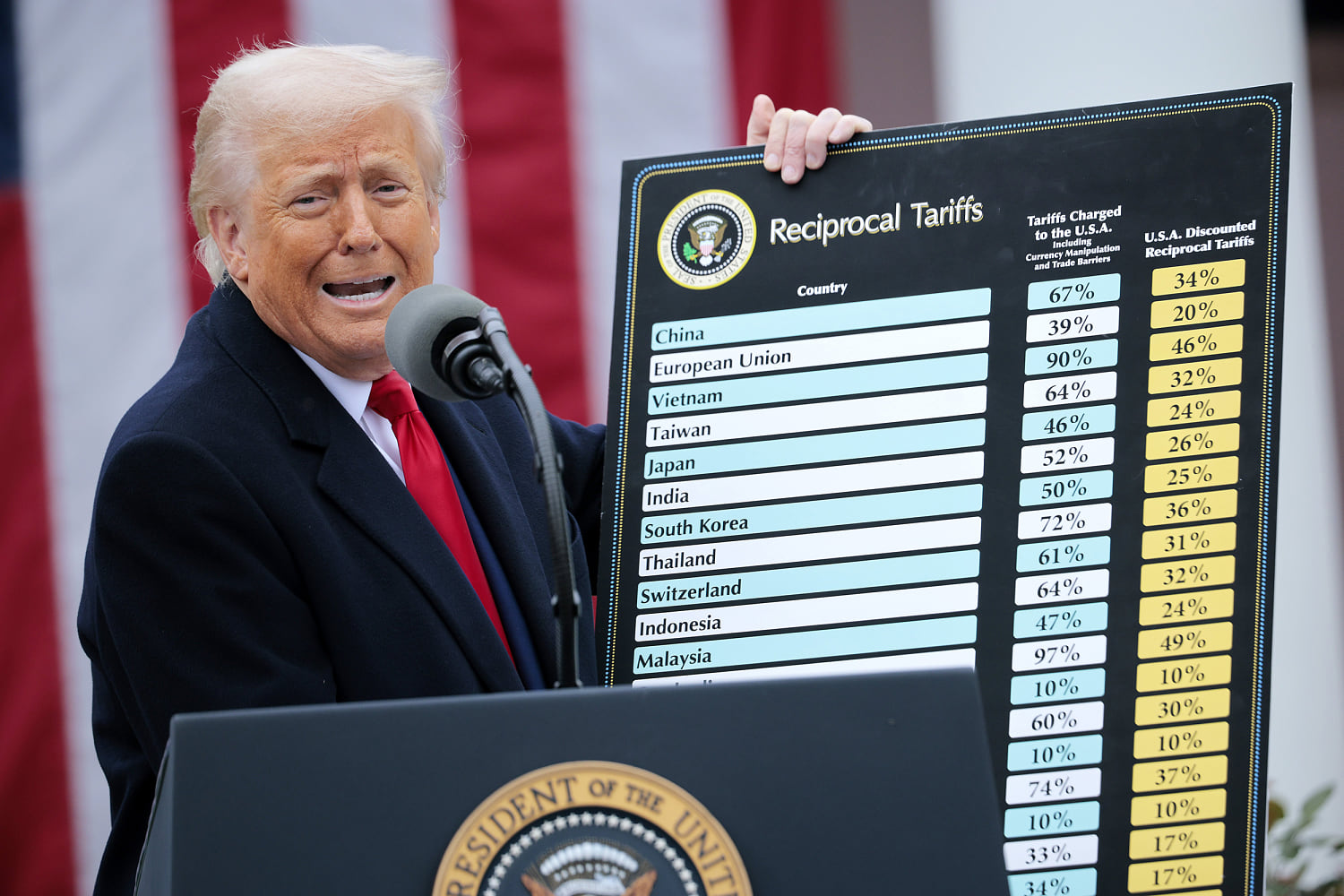
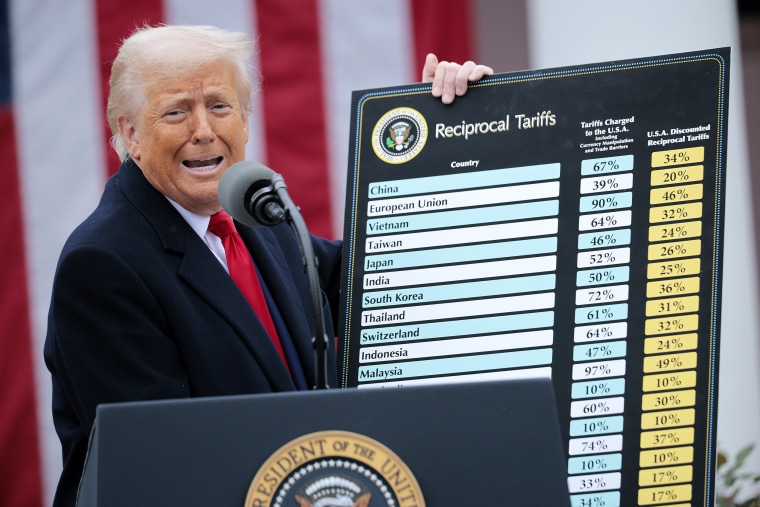
A federal appeals court ruled against President Donald Trump’s tariffs on Friday, but the ruling won’t take immediate effect because the court is giving the administration time to appeal to the Supreme Court. So as with nearly every big issue in American life, the justices may have the last word.
Attorney General Pam Bondi said the administration will appeal. The president said in his own social media post that if the ruling stands it would “literally destroy the United States of America.”
The ruling came Friday from the U.S. Court of Appeals for the Federal Circuit. It dealt with five executive orders imposing tariffs “of unlimited duration on nearly all goods from nearly every country in the world,” as the court put it. The U.S. Court of International Trade had previously ruled in May that the tariffs ran afoul of a federal law called the International Emergency Economic Powers Act (IEEPA). The government appealed to the Federal Circuit, which upheld the trade court on Friday.
“Because we agree that IEEPA’s grant of presidential authority to ‘regulate’ imports does not authorize the tariffs imposed by the Executive Orders, we affirm,” the appeals court said, adding that it wasn’t weighing in on “whether the President’s actions should have been taken as a matter of policy.”
The court also said that further review is needed back in the trade court regarding the universal injunction it granted. The appeals court cited the Supreme Court’s ruling in the birthright citizenship case that dealt with that subject in June, after the trade court ruling came out.
The Federal Circuit’s ruling on Friday split the 11 judges who heard the case 7-4.
The judges also issued an order accompanying the ruling that keeps it from taking effect through Oct. 14. If a Supreme Court appeal is filed by then, the appellate ruling will remain on hold either until the Supreme Court declines review or issues its own ruling.
Four judges added a separate opinion that agreed with the majority, but further expressed their view that IEEPA not only doesn’t authorize Trump to issue the tariffs in these executive orders, but that it doesn’t authorize him to issue any tariffs at all.
Four other judges dissented, writing that they agreed with the majority that the trade court had jurisdiction, that the plaintiffs had standing to bring a lawsuit and that (if the tariffs are unlawful) the case needs to be sent back to the lower court for further review; but they disagreed with the substance of the lower court’s ruling that the tariffs are unlawful.
Subscribe to the Deadline: Legal Newsletter for expert analysis on the top legal stories of the week, including updates from the Supreme Court and developments in the Trump administration’s legal cases.
Jordan Rubin is the Deadline: Legal Blog writer. He was a prosecutor for the New York County District Attorney’s Office in Manhattan and is the author of “Bizarro,” a book about the secret war on synthetic drugs. Before he joined BLN, he was a legal reporter for Bloomberg Law.
The Dictatorship
A teenager died by suicide after confiding in ChatGPT. That should be a wake-up call.

In family photos, you can see 16-year-old Adam Raine grinning ear to ear. But the California teen’s prankster personality concealed a deep current of depression and despair. And earlier this year, say his parentsChatGPT — which Adam went to for comfort — helped him take his own life.
Earlier this week, Adam’s mother and father filed the first known wrongful death suit against OpenAI. The lawsuit includes ChatGPT logs from Adam’s phone, which show how completely he was lured in to rely on a Big Tech product for companionship — and how, time after time, that product ignored warning signs and structurally failed him. At first, he turned to AI for homework help. Then, as chronic illness and problems at school narrowed his world, he called on it for comfort. Instead, the lawsuit alleges, it became an accelerator for self-harm and guided him through his death by suicide. (In a statement to NBC News, an OpenAI spokesperson confirmed the authenticity of the logs, but said the lawsuit did not include the full context of ChatGPT’s responses.)
Chatbots are designed to keep kids hooked — even when they need off-ramps for real-world help.
As the mother of two boys, 3 and 5, I can only imagine the pain Adam’s parents are feeling. But I know that families across the country share a fundamental anger that Big Tech companies willingly risk the lives of our kids, an anger that grows every time we hear about the loss of a young person like Adam.
More and more frequently, kids are confiding in Big Tech’s AI chatbots, not just when they want help with homework, but when they’re lonely or in pain. Because AI chatbots are designed to be sycophantic and to adeptly mimic human emotion, children can’t always tell truth from fiction, or distinguish real love and concern from a machine-generated response. That makes kids dangerously vulnerable to forming unhealthy attachments.
After the Raines filed their lawsuit, an OpenAI spokesperson said the company was “deeply saddened by Mr. Raine’s passing.” The company published a blog post listing “some of the things we are working to improve” when ChatGPT’s safeguards fail. That is too little, too late — just like Big Tech’s attitude toward safety in general. Rather than do anything to help address this problem, these companies prioritize hyping up the uses of AI and increasing its “market share” of our kids’ waking hours and mental bandwidth.

In fact, Mark Zuckerberg has said he wants his Meta AI companion to fill users’ “demand for meaningfully more” real-world friends. In 2023, The Wall Street Journal reportsthe chatbot’s product managers “told staff that Zuckerberg was upset that the team was playing it too safe,” which led to a loosening of the standards that kept conversations from becoming too sexualized.
Meta’s internal documents allowed their AI chatbots to “engage a child in conversations that are romantic or sensual” until the company was asked about it by Reuters. New research from the family advocacy group Common Sense Media finds that Meta’s chatbot for Instagram and Facebook willingly coaches teens on how to carry out self-harm, disordered eating and violent fantasies.
As AI chatbots become confidantes and even parasitic bosom buddies, many children share secrets they won’t or can’t tell their families. Chatbots, though, are designed to produce engagement and keep kids hooked — even when they need off-ramps for real-world help. Products like ChatGPT — tragically, unspeakably — become abettors and co-conspirators in suicidal plans, with the chatbot, according to the lawsuit, even providing Adam advice on how to tie a noose.
If this were any other industry, lawmakers would have listened to the thousands of parents and young advocates who have been banging down their doors pleading for change.
The scale of the harm wrought by these companies grows by the day.
But Big Tech has big money, which means big lobbying — and so far, that has blocked real safeguards. Instead of working with lawmakers, these companies even pushed for a ludicrous federal moratorium on AI regulation, which would have negated hundreds, if not thousands, of state laws already on the books and blocked any state laws dealing with AI for 10 years. This prompted a nationwide revolt of parents, attorneys general, governors and state legislators on both sides of the aisle.
My two boys haven’t yet begun to ask me for phones, and they don’t know what social media or chatbots are. And still I’m scared to death we won’t get through to lawmakers in time to save them. My eldest is a whip-smart, sensitive kid, who I’m terrified will be destroyed by social media, either preyed upon by an online child predator, or persuaded to do himself harm because his young mind won’t comprehend that the “friend” he is confiding in is actually a machine humming away in a massive data center somewhere, helping him — like it did for Adam — plan a “beautiful suicide.”
Meanwhile, tech giants are buying off academics and whitewashing research about the dangers their products pose to our kids. They’re infiltrating trusted institutions like the PTA, backing “safety” initiatives while fighting to defeat safety reforms, suing organizations they view as threats. They try to silence whistleblowers — even when those whistleblowers are called before Congress. And now they’re even creating political super PACs to intimidate lawmakers into voting their way and ignoring tragedies like Adam’s.
Let me be absolutely clear: Politicians should think twice before accepting donations from these Big Tech super PACs. The scale of the harm wrought by these companies grows by the day. They are not working in good faith with legislators and regulators to ensure that our privacy and our children’s lives are protected.
Thankfully, state legislators don’t have to wait for Washington to act. In California, for instance, state Sen. Steve Padilla introduced SB 243which would establish safety guardrails for “companion” chatbots and make companies track interactions with users in crisis. And AB 1064the LEAD for Kids Act, championed by Assemblymember Rebecca Bauer-Kahan, would ban emotionally manipulative AI companions for kids, require parental consent and more.
These are all sensible measures — and they are under attack by the very companies whose products are harming our children. Just last week, Meta announced a California-specific super PAC to go after such bills.
Meta, Apple, Google, OpenAI and their ilk will never regulate themselves, so we urgently need to do it before more children die and more families are destroyed. In Adam Raine’s memory, we have an opportunity to prevent future tragedies — if lawmakers will listen.
The Dictatorship
After the Annunciation school shooting, the gun lobby is counting on our doing nothing
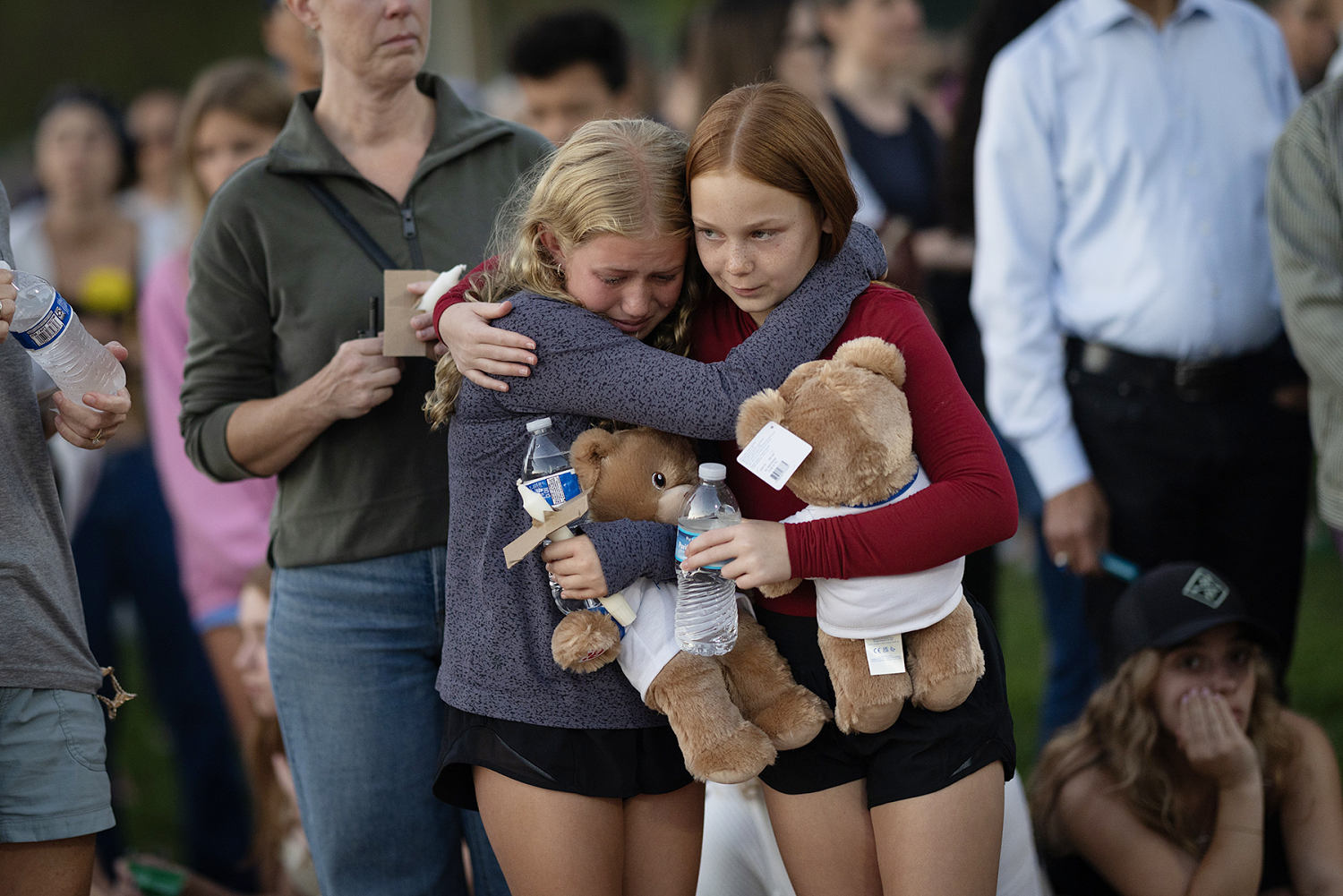
They showed up to Annunciation Catholic School on the far south side of Minneapolis on Wednesday wearing backpacks and new shoes their parents may have just purchased during back-to-school shopping. They filed into the adjacent yellow brick Catholic church for the annual start-of-the-school-year Mass with adults shushing their giggles and excitement. After all, Annunciation had just got a new principal and a new priestand the older children had been assigned their “buddies” from younger grades who would watch them and learn the scripture and rituals of the Catholic Mass.
A barrage of bullets exploded through the stained glass windows and shattered yet another American community.
And then, during a religious service that was supposed to usher in a school year defined by the phrase “a future filled with HOPE,” a barrage of bullets exploded through the stained glass windows and shattered yet another American community.
Two families that dropped their children off at school will never see them again. There is now an empty chair at each table. Two bedrooms frozen in time. Two futures snatched away by a shooter’s cowardly rage. Eighteen more people are physically injured. Some remain in critical condition. But “in critical condition” could just as well describe the whole Annunciation community, the city of Minneapolis and, really, America in its exhausted entirety.
Those babies — one 8 and the other 10 — gunned down in the pews at their Catholic school have forced us all to face a sickening lesson about the current state of our country. The people responsible for writing the laws that govern us have developed a tolerance for children being slaughtered in their schools.
Instead of saying, “No more of this,” our society has introduced more attempts to protect kids in places that should be inviolate. Metal detectors. Security guards. Active shooter drills. Thankfully Annunciation had adopted a protocol of locking the church doors before Mass began. Minneapolis Police Chief Brian O’Hara said locking the doors likely saved many lives.
We should never ever normalize a scene as horrific as this, but somewhere along the way, mass casualty events have become a grim fact of American Life. It’s hard to admit this, but the unbearable has become unacceptably routine. I hate writing that sentence. These facts should cause us sorrow and even shame. The death and despair. The wounds that last a lifetime. The assault on our sense of security. The targeting of CHILDREN. And the ready access to guns that are essentially weapons of war. All of this should be unacceptable. School shootings are still devastatingly shocking, but history shows that these atrocities do not guarantee change.
People committed to truly creating a safer America must figure out how to stand up to a gun lobby that is counting on a woefully predictable pattern. Shock. Grief. Outrage. Anguish.
Calls for thoughts and prayers. Vigils. Funerals. Editorials.
Pledges for action and change.
All of it falling short of achieving a goal we should have reached years ago — restricting easy access to assault weapons.
Another part of this predictable pattern is a debate over what led the shooter to this kind of unthinkable violence. The motives, lifestyle and so-called manifesto will be studied. Was the shooter a lonely outcast or angry and addled? But no matter the answers to those questions, there is a constant through line in these mass shootings at schools and movie theaters and concerts and clinics: access to war-fighting, high-velocity firearms that have no place among civilians.
I grew up on the south side of Minneapolis, and I attended a Catholic school just a few miles from Annunciation.
Since Republicans will be predictably silent, Democrats and those who can find their way to support reasonable gun safety measures need to figure out how to react to the constant ticktock of violence with a constant amplification of their demand for gun reform.
I grew on the south side of Minneapolis, and I attended a Catholic school just a few miles from Annunciation. I know that parish well. It’s part of a cluster of Catholic church/school campuses that dot the Twin Cities. Annunciation has always been a particularly active congregation, in part because of the stability in its surrounding upper middle-class community.
It’s a thriving hub that hosts fish fries, bingo nights, scout troops and basketball leagues. The buildings buzz all week, even in the summer months when kids learn how to ride bikes on the recess lot and seniors do laps to get their steps in. It’s where south siders buy Christmas trees and the church engages in a Mission Monday program where the first day of the week is dedicated to participating in programs like Meals on Wheels, making goodie bags for seniors living in elder care centers or turning old T-shirts into re-usable diapers for the sister parish Annunciation adopted in Haiti.
Catholic churches throughout the city have sometimes struggled in recent years to maintain active congregations and thriving schools. As the Twin Cities went through a series of changes with demographic shifts, rising poverty rates and conversely pockets where working families were priced out of neighborhoods, Catholic parishes were mandated by the diocese to be not just in the community but of the community. Annunciation, built in 1922 on the far stretch of the city near where the suburbs start, has thrived as a model of that creed.
But now it is the most recent marker in America’s daisy chain of school shootings. The Tudor building that was such a place of pride with its careful plantings and holiday decorations will forever be a monument to grief. No different than Sandy Hook, Columbine, Jonesboro, Uvalde, Parkland and so many more. Too many more.
I hope that Annunciation’s community-strong model will provide both steel and balm.
Eventually the students will return to school. Drivers along 54th Street will once again hear the squeals from the playground and the sound of children’s voices united in sing-song hymns floating through an open classroom window.
“Annunciation” refers to the moment the angel Gabriel told Mary she would conceive a son.
Shoppers visiting the Kowalski’s grocery store across the street or the Holiday gas station just down the road will forever feel a jolt of anguish. How could they not?
The Twin Cities is a place that was already reeling from another large casualty shooting earlier that weekthe shooting of lawmakers and their families in June, and May marked the fifth anniversary of police murdering George Floyd. And with this latest monstrous assault, it has joined the litany of communities forever marked by the pain of schoolchildren being deliberately murdered.
Those communities all figure out how to move forward, but they never really move on. And we should not either.
In religious teaching, “annunciation” refers to the moment the angel Gabriel told Mary she would conceive a son. What if we honored those children who lost their lives and all those families affected by this shooting with a full throttled denunciation of high-velocity assault weapons, followed by swift legislative action, punitive laws and stiff penalties.
The gun lobby is counting on all of us to go back to that predictable pattern after a school shooting in which outrage fails to usher in true change.
Maybe this time we can finally prove them wrong.
Michele Norris is a senior contributing editor for BLN and the author of “Our Hidden Conversations: What Americans Really Think About Race & Identity.”
-
Uncategorized10 months ago
Bob Good to step down as Freedom Caucus chair this week
-

 The Josh Fourrier Show10 months ago
The Josh Fourrier Show10 months agoDOOMSDAY: Trump won, now what?
-

 Politics10 months ago
Politics10 months agoWhat 7 political experts will be watching at Tuesday’s debate
-

 Politics10 months ago
Politics10 months agoHow Republicans could foil Harris’ Supreme Court plans if she’s elected
-

 Politics6 months ago
Politics6 months agoFormer ‘Squad’ members launching ‘Bowman and Bush’ YouTube show
-
Economy10 months ago
Fed moves to protect weakening job market with bold rate cut
-

 The Dictatorship6 months ago
The Dictatorship6 months agoPete Hegseth’s tenure at the Pentagon goes from bad to worse
-

 Politics10 months ago
Politics10 months agoRFK Jr.’s bid to take himself off swing state ballots may scramble mail-in voting




